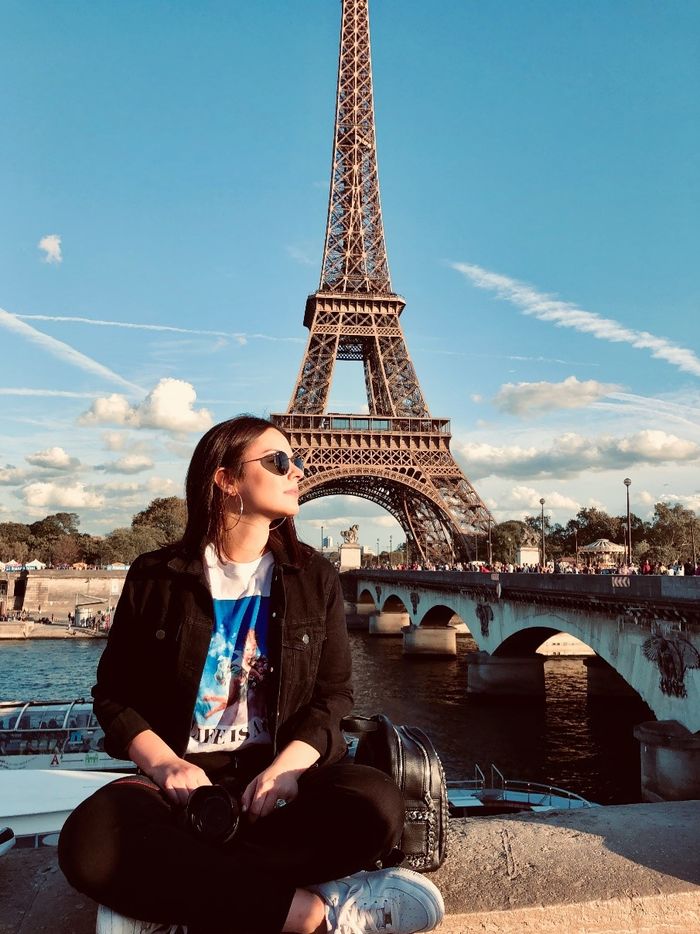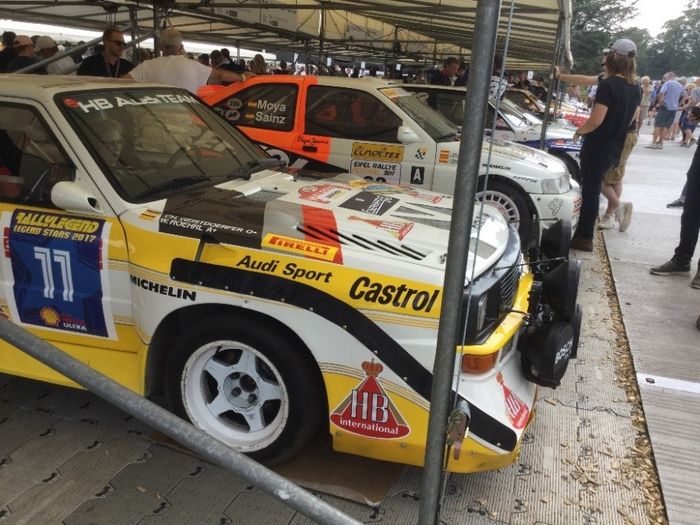Penn State Behrend Student Profiles
- Zane in Germany
- John in New Zealand
- Giulia in Spain
- Christopher in the United Kingdom
- Aimee in Germany
- Elizabeth in Spain
- Natalie in Canada
Zane in Freiburg, Germany—Spring 2017
IES: European Union Program
Why do you recommend study abroad to other students?
The value of seeing the world from a non-American perspective is immeasurable. It pushes you out of your comfort zone and forces you to question things about your own culture. It grants you an appreciation of different ways of life and makes you realize how diverse the human experience is.
What advice would you give to future study abroad students?
Don’t go with set-in-stone plans or expectations. Before I left, I made a list of all the places I wanted to visit and only ended up getting to visit maybe a third of them. But instead, I went to places I never dreamed of and loved it! Going with the flow and just living in the moment will allow you to have experiences that you’ll always cherish. Also, within reason, say yes to everything!
What was the housing like in your study abroad program?
Freiburg is a university city, so it has a large student population. I stayed in a student apartment with one American, who was in my study abroad program, and three German college students. Each of us had our own room.
What’s your best memory from your time abroad?
Too many to count! Taking a boat tour of Paris as the sun set, walking along the remnants of the Berlin Wall, and going to the opera in Rome all stand out as highlights.
What factor about your host country do you think people would be surprised to learn?
Cool Ranch Doritos are called “Cool American.” Also, almost all stores close at 8:00 p.m. and aren’t open on Sundays.
John in Wellington, New Zealand—Fall 2016
Victoria University
What advice would you give to future study abroad students?
An extremely important piece of advice would be to get your visa early. It can take months to get especially if there are issues with your application, so as soon as you have your flight dates figured out, you should apply for it. I didn’t receive my visa until the day before I was set to leave on my flight, which made that week exceedingly nerve-racking. You also need a visa for certain countries if you have a long layover so that would be something you need to keep in mind. I almost couldn’t go to Australia on my way to New Zealand because of that issue.
I would also say to check and see if the courses you want to take at that institution are restricted to international students. I may have done things a bit differently had I known that the majority of my upper-level biology classes I was going to take were restricted. I noticed that this is a problem, particularly for science majors, given that there are usually minimal enrollment slots and you should consider this when choosing your abroad institution.
Describe your favorite classes abroad.
My favorite classes abroad were the courses that were uniquely New Zealand. I took a field biology class, which was probably my favorite because I got to spend a week in the bush studying plant and animal life. I also took an introductory geology course that had a field component so I got to go to all these places I wouldn’t have otherwise if not for the course.
What was the housing like in your study abroad program?
Housing was interesting, to say the least. I lived in a flat with three other people from three different places, which were Japan, California, and a Kiwi from New Zealand. You can learn a lot about a country or area by living with someone from that area. I would recommend living with diverse roommates, if you have the option, because it was a lot of fun.
What was your greatest challenge?
The greatest challenge I faced was the fact that I didn’t know a single person when I got there. I had to learn to be a bit more social than I usually am, and figure new things out like planning a several-day trip by myself, which allowed me to grow as a person. I have much more self confidence that I can take on the challenges that life throws at me now, since I spent four and a half months in another country.
What’s your best memory from your time abroad?
My best memory from my time abroad was definitely my trip to Kaikoura. I got to watch sperm whales and be on a boat for several hours so that made for an amazing morning. Then I spent the afternoon on a guided ocean-kayaking trip where I got to see seals up close in the water. I was very tired that night, but it was well worth it.
Complete this sentence: If I could do it over, I would...
I would have saved up a bit more money if I could do it over. Traveling is very expensive, especially if you do programs that show you multiple areas in one day, and I would have liked to have traveled a bit more. I also would have studied a bit more. My grades were fine, but they would have been better had I been more motivated to study.
Giulia in Barcelona, Spain—Fall 2018
IES: Barcelona: Liberal Arts & Business Program
How would you describe your study abroad experience?
My experience was incredible. It went beyond just traveling, studying, and spending time away from home—it was a period of personal growth. I was exposed to so many different cultures and met people who changed my life for the better. Every day seemed like a new adventure and although four months went by extremely quickly, I feel like I have a lifetime's worth of stories to tell. It was an unforgettable experience that without a single doubt pushed me to grow personally and academically.
What factor about your host country do you think people would be surprised to learn?
They think it’s a bit strange when you smile at a random stranger on the street.
What was the housing like in your study abroad program?
I was extremely skeptical about housing abroad because I did not know anyone in my program. I ended up choosing apartment housing with random roommates. My apartment had five girls in it (including myself)—three were in my program and the other was a BCC (Barcelona Cultural Companion). The apartment was clean and furnished. There were two double-rooms, two single-rooms, and two bathrooms. Also, the location was amazing because it was a 20-minute walk to the IES Abroad center and a 10-minute metro ride. I ended up getting along great with every single one of my apartment mates and we became super close friends. The only negative aspect about the apartment was that the rooms did not have air conditioning, but this is very common in Europe and I saw it as a part of the experience.
What’s your best memory from your time abroad?
It’s honestly impossible to just choose one. In a nutshell, I will never forget the trips that I went on and the people that I met. It was a mind-blowing experience and there were thousands of little things that contributed to it.
What advice would you give to future study abroad students?
Go with an open mind and don’t be afraid to say yes to new opportunities. The first trip I went on was with this girl that I had just met from my program and she ended up becoming my closest friend there. You need to be open to meeting people and going outside of your comfort zone to make the best out of your experience!
Christopher in Brighton, United Kingdom—Summer 2018
University of Sussex
How would you describe your study abroad experience?
Life changing, and not in the corny sense. Moving abroad, specifically to England has always been a dream. Studying in the country and learning the culture really gave me that push to search for a future in England. If you have ever considered graduate/master's programs, see what your host country may offer, and possibly tour the schools while you are there.
What’s your best memory from your time abroad?
The Goodwood Festival of Speed was my greatest memory, and if I am honest is part of the reason I chose to study in the southern coast of England. As someone who loves vintage cars and modern supercars alike, this is the mecca. With a hill climb, rally stage, and off-road stage, I don’t think you could ask for more. No matter where you study, there are bound to be special events that may interest you. Find those events before leaving the states if possible and determine your travel plans and ticket arrangements; early planning makes for enjoyable events.
What was your biggest surprise about the location, culture, or other aspects of your program?
The natives are the kindest people, I did not expect hostility, but I also didn’t expect how kind they would be. From taxi drivers to random people in coffee shops, they usually wanted to strike up a conversation and give you as much information as possible about their town or city. This was generally the greatest way to find the best food and attractions. I must admit I did get stranded at an event, taxis had quit running for the day, but the first event worker I asked offered to drive me to the nearest train station free of charge. Honestly, it was amazing how kind everyone was to a kid backpacking his way around the country to look at cars in his free time. Luckily with the program I attended, some of the students went to this university year-round, so I was also able to make friends with them and, again, they were great people.
Describe your experience with culture shock or reverse culture shock.
Reverse culture shock was the most prominent for me. Leaving a country where jumping on a train, bus, or tube to go anywhere in the country is massively different than driving yourself anywhere. Although the lack of personal transportation and reliance on public transportation may seem limiting, it is quite the opposite. Being able to get to any event or town without having to drive yourself makes travel a breeze; a good book or a few downloaded movies is a great way to pass the time while using public transportation.
What factor about your host country do you think people would be surprised to learn?
The food, it’s amazing. Britain usually has a bad reputation for food, but the diversity and quality are incredible. London has possibly the greatest selection, from Asian cuisine to the best burgers, and establishments from elegant dining to shacks. Sometimes you must leave the tourist areas and find where the locals eat; it was always certainly worth it in my case.
Aimee in Rosenheim, Germany—Summer 2017
Internship
Why did you choose this program?
I choose this because I thought that working abroad would be a completely unique experience compared to studying. I am also an IB major, so I saw it as an opportunity to get relevant career experience.
What was the housing like in your study abroad program?
A local university that has a relationship with Penn State helped me. I stayed at a boarding house nearby.
What was your greatest challenge?
My biggest challenge was adapting to the work culture. Europe has a much more relaxed work environment. It took some time to understand the mentality at work.
What’s your best memory from your time abroad?
The traveling I got to do after. My best decision was taking advantage of how close and easy it is to travel around Europe. It made my experience a lot more memorable.
What was your biggest surprise about the location, culture, or other aspects of your program?
I was surprised by how beautiful and clean the environment was. I was also surprised by how common American culture was. There were American movies, music, and television. Being American, everyone has some background on your culture which could be both good and bad.
What advice would you give to future study abroad students?
Internships require extra work compared to studying abroad. There is a lot more politics involved, especially if it is paid, but do not get discouraged by the paperwork. It is worth it.
Complete this sentence: If I could do it over, I would...
Stay longer and not be afraid to spend an extra semester even if it means getting behind.
Elizabeth in Ronda, Spain—Summer 2016 (through University Park)
Program Information: Ronda, Spain
(Top photo on right: Elizabeth's roommate, Margo; host brother, David; host mother, Reyes; and Elizabeth.)
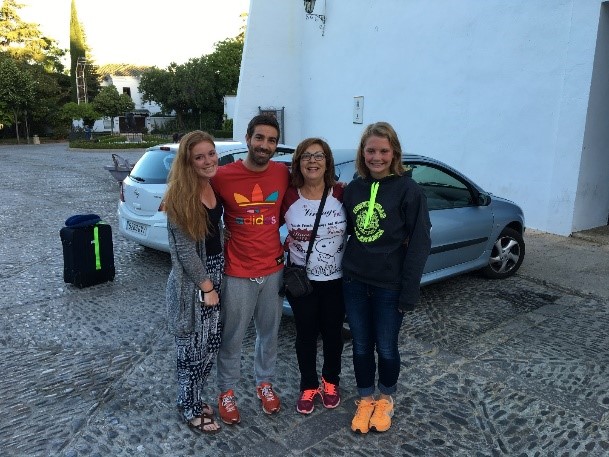
Why did you choose this program?
I chose the Ronda program because I really wanted to try a homestay and experience a new part of Spain. Typically, when you hear that someone studied abroad in Spain, it’s at one of the larger universities in the bigger cities (Madrid, Barcelona, Granada, etc.). I wanted to see a lesser well-known part of the gorgeous country and experience the Southern urban culture. Southern Spain has some of the most breathtaking views in all of the country. Another reason why I chose this program was because of the included excursions to other parts of Spain on the weekends (Granada, Madrid, Seville, Cadiz). It was a wonderful opportunity to become a world traveler along with 17 other students from Penn State.
What was the housing like in your study abroad program?
For my study abroad program, I was able to participate in a homestay. At first, I was extremely nervous about living with a family I had never met before, so I requested to have a roommate from Penn State. However, from the moment that my host family arrived to pick me up, I knew I would be in caring hands. They welcomed me with open arms and were so excited to learn all about me and share their wonderful country with me. Having a roommate was awesome because it allowed me to make a new best friend as well as have someone to talk to about culture shock. My host family was amazing, and we still keep in touch on Facebook. By doing a homestay, you really have the opportunity to use your language skills constantly and learn so much more about the culture by truly living in it. We always had meals together and really became a close family over the six-week period. It was really hard to say goodbye without tears coming to our eyes.
What’s your best memory from your time abroad?
One of my favorite memories from study abroad was when we would regroup each night as Penn Staters and have dinner together somewhere around town. This was a chance to not only continue to practice our language skills and try new food in a different part of Ronda, but also to share the memories we made that day or new things we had learned or experienced. Towards the end of our trip, several times we packed a picnic dinner and went for a hike to El Puente Nuevo. The view was breathtaking, and we did some late-night karaoke under the stars. These memories are priceless.
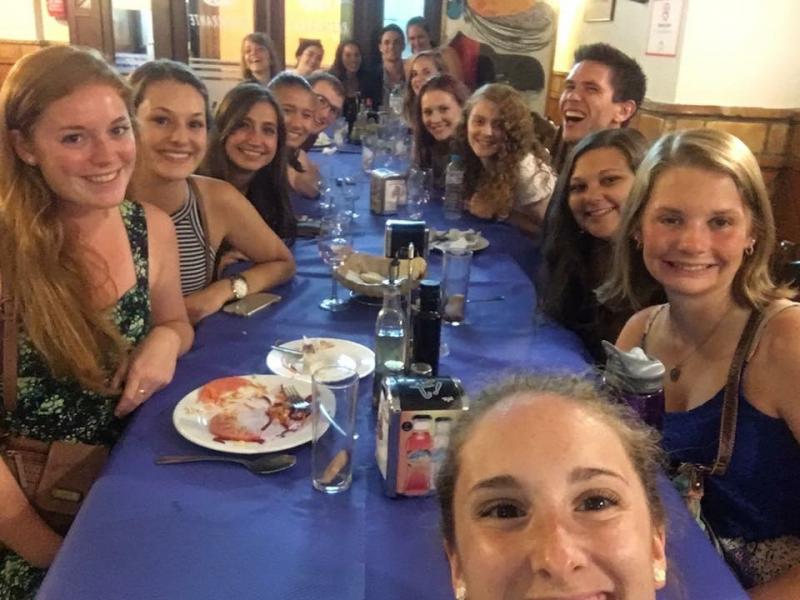
What was your biggest surprise about the location, culture, or other aspects of your program?
The biggest surprise about my program was all of the surprise events that were planned for us throughout the trip. For example, one night we were told to meet at the school in a particular outfit. We arrived to find out that we were partnering up and learning how to Flamenco dance from a real instructor. Also, when we were in Seville, we got to travel the city in horse-drawn carriages. After class one day, we were able to visit a culinary school and make traditional dishes for lunch. Together as a group, we hiked into the gorge and took pictures with the waterfalls. We even explored several caves and learned about their historical significance. One of the most interesting surprises was a trip to a ham factory. We just never knew what was going to pop up on the schedule next!
Why do you recommend study abroad to other students?
I recommend study abroad to other students because you will learn and experience things that simply cannot be found anywhere on campus. You are directly immersed in the language, the culture, and the people. You are placed outside of your comfort zone and forced to find a new balance and try new things. Studying abroad truly allowed me to grow as a person and become more confident and independent. It is amazing to look back on those six weeks and think about how I was living in a different country by myself and enjoying every moment of it. My Spanish skills improved tremendously because I was consistently using and listening to the language. If I wanted to go somewhere or explore a new part of town, I had to just dive in headfirst and go for it. When I returned to the United States, I could tell that this opportunity had changed me for the better in numerous ways. I cannot wait to go on my next study abroad adventure.
If I could do it over, I would…
100% study abroad again in a heartbeat. If I could change anything about the program, I would lessen the amount of class credits required (3 courses, 9 credits) so that I could spend more time exploring Spain. I would also like to have learned about the man selling churros down the street from my house sooner than I did because they were delicious and not like the churros we have here.
Natalie in Toronto, Canada—Summer 2016
Program Information: Toronto Metropolitan University in Toronto, Canada
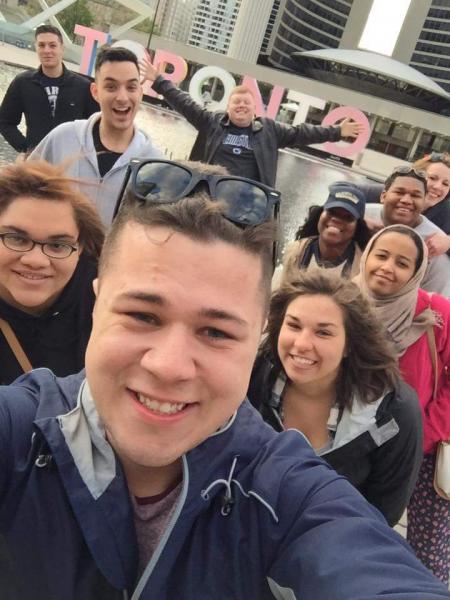
Describe your favorite classes abroad.
There are only two classes offered in this program: 199 and 499. The 499 class, which is the one I took, is the same as the 199 only has a research paper due at the end of the course. The class was taught by both a Behrend and a Toronto Metropolitan University (formerly Ryerson University*) professor. I really enjoyed this aspect because it gave us a chance to experience a real Canadian classroom. The class compared Canadian politics to American politics, and every class featured an impromptu debate between the students on the different policies and our thoughts and beliefs on those policies. The best part about this class was learning about the Canadian perspective of the United States and their views and thoughts on our policies. It was incredibly interesting to have our culture and political system presented to me in a completely different light than I have ever thought of it before.
What was the housing like in your study abroad program?
We stayed in the International Living/Learning Centre in the middle of downtown Toronto. It turns into a hotel in the summer that the Hospitality major students at the university work at and run. Everyone had their own room, bath included, and we were all on the top floor of the building. There was free wifi, tv, and a kitchen in the common room on every floor.
What’s your best memory from your time abroad?
My best memory of my time abroad was when a few friends and I went to Niagara Falls in the middle of the night. We accidentally crossed the border looking for a breakfast diner without our passports, but the Canadian customs officer just laughed at us when we came back through. He ended up giving us directions to a really good breakfast diner shaped like a flying saucer.
What was your biggest surprise about the location, culture, or other aspects of your program?
The biggest surprise was how much freedom we had. Our class was Monday through Thursday from 1:00–4:00 p.m., so we had so much time to explore and experience the city. Another big thing was how safe I felt in the city. Canada has very few problems with guns on the streets compared to the United States, so it was really freeing to walk around a city of Toronto’s size in the middle of the night and not feel afraid for my safety. I never realized how much I actually thought about my safety until I didn’t have to in Toronto. It’s not to say that Toronto is the safest city, but compared to cities of comparable size in the United States, the crime rates are staggeringly less.
Describe your experience with culture shock or reverse culture shock.
I had more of a reverse culture shock than a culture shock. I enjoyed living in Toronto so much that it was easy to adapt to the way of life there. When I came back I was struck by the lack of diversity the most. Toronto is such a diverse city, it almost seems like there is no one race majority there, and everyone lives pretty peacefully together. The second was just getting used to not living in the middle of a city anymore: having to drive everywhere, how quiet it got at night, how few people were on the streets and in the stores.
* Ryerson University was renamed Toronto Metropolitan University in April 2022.
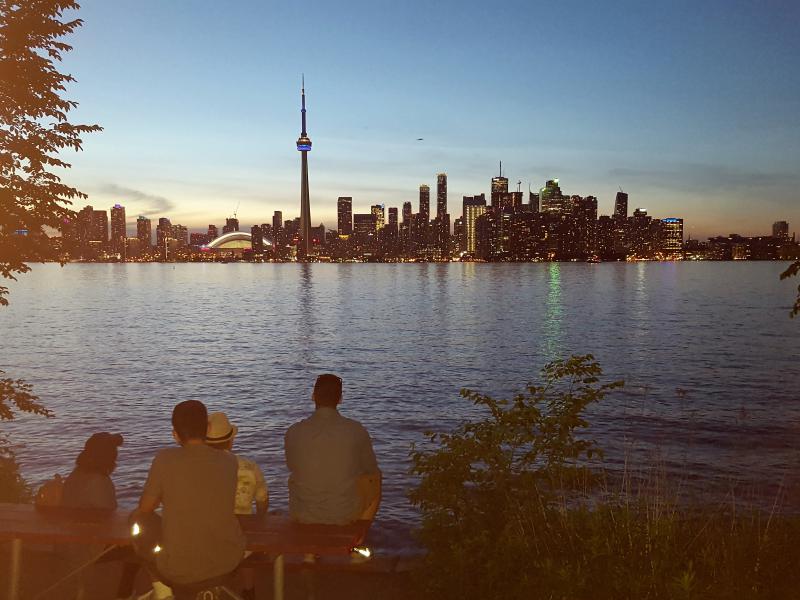
Students viewing Toronto's beautiful skyline at dusk.
